“We were human wrecks” – József Dráfi
(1928, Újpest – 1945, Barth)
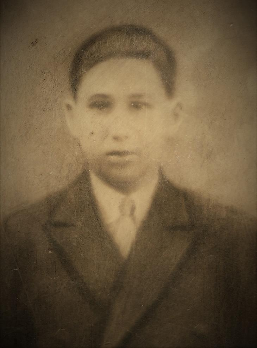
József Dráfi was born on May 6, 1928 in Újpest, in a Roman Catholic Roma family from Carpatho-Ruthenia. His family had been blacksmiths for generations, and after finishing primary school, he chose the same career. His ancestors were of Újpest origin since the founding of the town in the mid-19th century. He lived with his parents and his sister Anna in the house at 6 Don Bosco (now: Sörétgyár) Street.
On 8 November 1944, he and his mother were on their way home from Érsekújvár where they visited family. On arrival at Budapest's Nyugati railway station, the police checked them and arrested the minor József on the basis of his (presumed) origin alone, referring to the decree on forced labour for Roma, which was already in force. Along with hundreds of other Roma arrested outside Budapest (in Rákospalota, Kispest and other localities), he was taken to the assembly camp set up in the Nagybátony-Újlaki brick factory in Óbuda. That was the detention site from where the procession of Jewish men and women from Budapest who had been handed over to the Germans for forced labour by the Arrow Cross authorities was also sent to the western border.
The Roma were deported from Óbuda to the central concentration camp in Komárom, where thousands of Roma and other persecutees from Transdanubia and Upper Hungary (Southern Slovakia) were held in inhuman conditions. József also met several of his Érsekújvár-born relatives in the Komárom camp. Ferenc Dráfi (b. 1928), Gábor Dráfi (b. 1910) and Géza Dráfi (b. 1898) were imprisoned there, as well as four other relatives of the same name, called Béla Dráfi. One of them was born in 1895, another in 1899, the third in 1905 and the fourth in 1924, also in Érsekújvár.
József and the others were deported from Komárom on the orders of the SIPO (Sicherheitspolizei - Security Police) in Budapest on the first transport carrying Roma and others. A total of 1512 people were crammed into the wagons. In addition to the 482 Hungarian political prisoners, Yugoslav internees and 200 Hungarian Jews, 175 Roma men were among them.
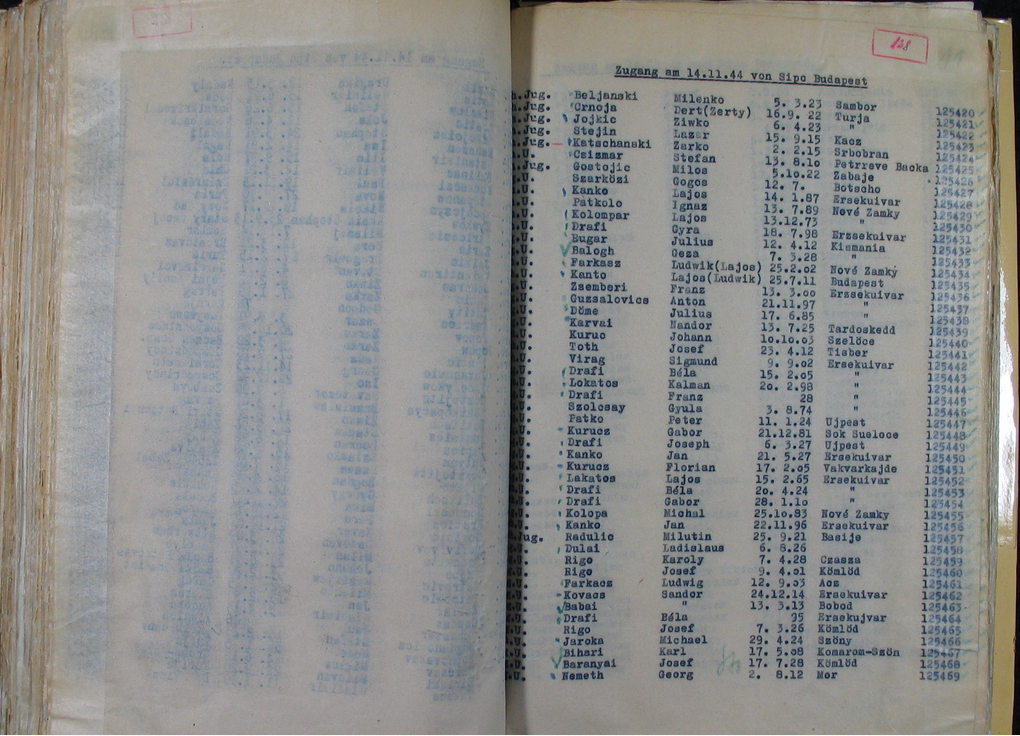
The registration book of the Dachau prisoners, including the names of József Dráfi and the Hungarian Roma who arrived with him on 14 November 1944 (ITS, Arolsen Archives)
The mixed transport arrived at the Dachau concentration camp on 14 November 1944. József was given prisoner number 125449. Two weeks later, on 28 November, he was transported to Ravensbrück with other Roma prisoners of blacksmith, locksmith and similar trades.
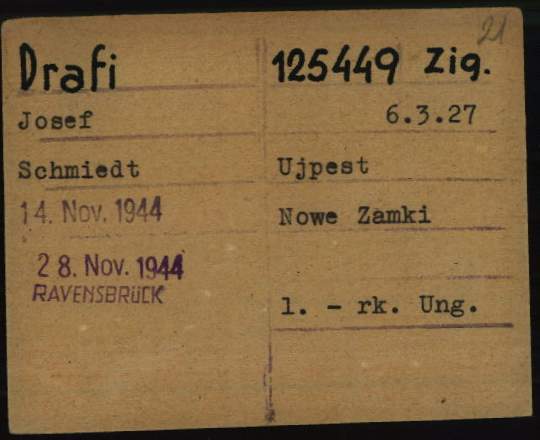
According to the Dachau record, József Dráfi was transferred to Ravensbrück after two weeks, on 28 November (ITS, Arolsen Archives)
Here he was given prisoner number 12587. His relatives, Adalbert Dráfi, two people by the name of Béla Dráfi (born 1895 and 1905) and Gábor Dráfi were assigned the numbers (12583-12586) which preceded him in the line.
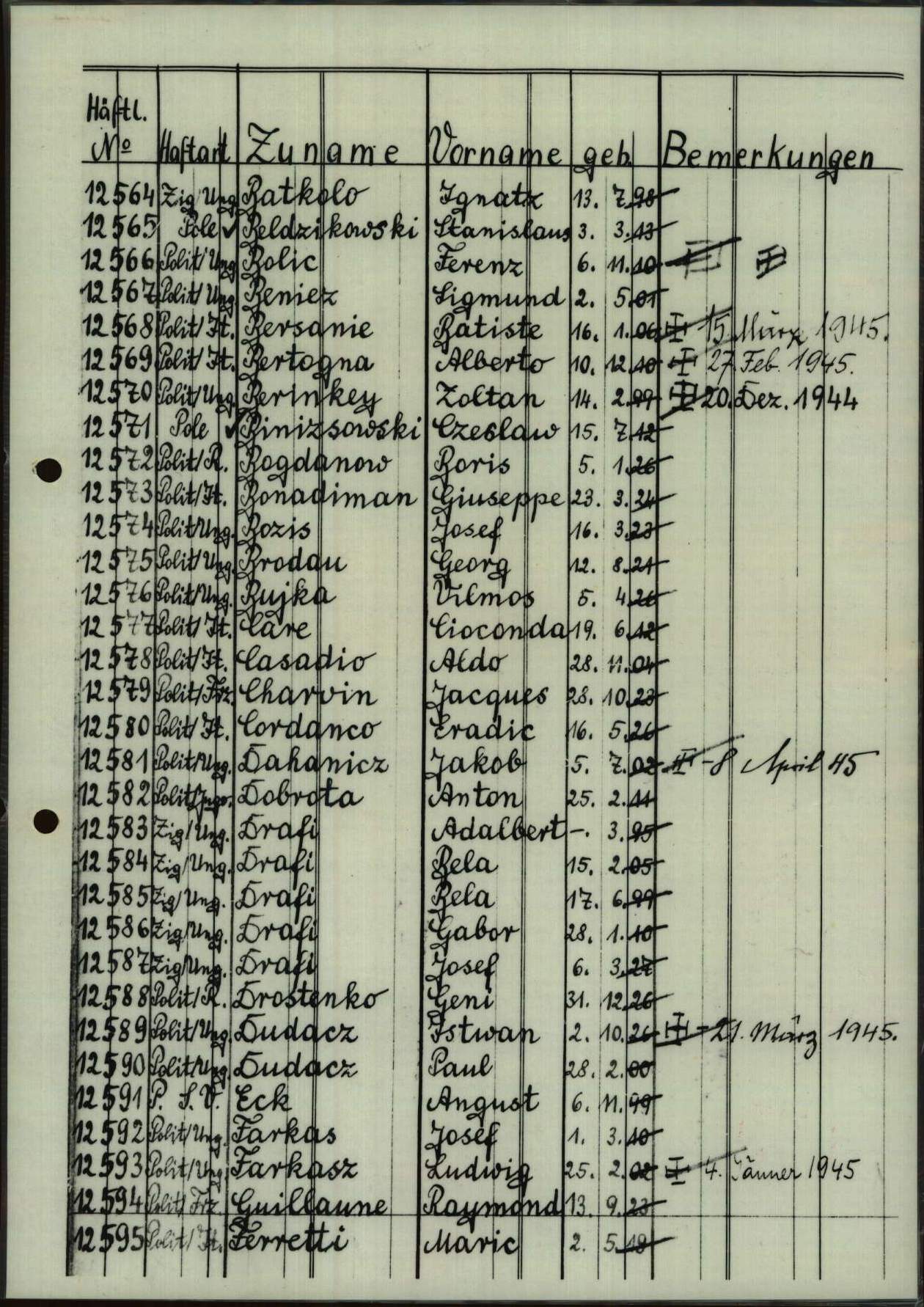
A page from the Ravensbrück registration book with prisoner numbers 12583-12587, members of the Dráfi family (ITS, Arolsen Archives)
Sometime in early 1945 he was sent to the subcamp Barth in West Pomerania (on the Baltic coast) for further forced labour. Here the prisoners worked in a factory of the German aircraft manufacturing company Heinkel. In addition to the Hungarian Roma, more than 100 Hungarian Jewish men and 300 women were also sent there. The former were transported from KL Sachsenhausen, the latter from Auschwitz-Birkenau. Later, labour servicemen from Bor also arrived.
In Barth, the work was hard, the care was poor and the treatment was particularly brutal. Women worked night shifts from half past six in the evening until half past eight in the morning. The daily ration of bread was initially 25 decagrams, then reduced to 12.5 decagrams. In addition, watered-down kohlrabi, carrot or cabbage soup was distributed. According to one Jewish survivor, "we weighed 35 kilos, we were human wrecks". An SS sergeant beat Jewish prisoners to death with bricks on a daily basis, SS-Kommandoführer Zay shot several men. Under these circumstances, it is no wonder that Barth became one of the most lethal of the Ravensbrück subcamps: the death rate in the camp was almost 10 percent. The bodies of 163 men and dozens of women were burned in the crematorium, and 291 prisoners were buried in the mass grave in the local cemetery.
In the spring of 1945, the situation deteriorated further, with hundreds of prisoners dying in the final weeks due to poor care, harsh treatment and poor sanitation. Sharing the fate of ten other fellow prisoners, József Dráfi also died on 20 April 1945, ten days before the arrival of the Soviet army and the liberation of the camp. He was not even 17 years old. Gábor Dráfi died on 24 April and Béla Dráfi (born 1905) on 28 April.
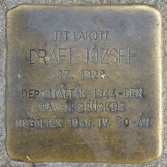
Stumbling stone in Újpest honoring the memory of József Dráfi (https://ujpestmedia.hu/in-memoriam-drafi-jozsef/ Private collection)






